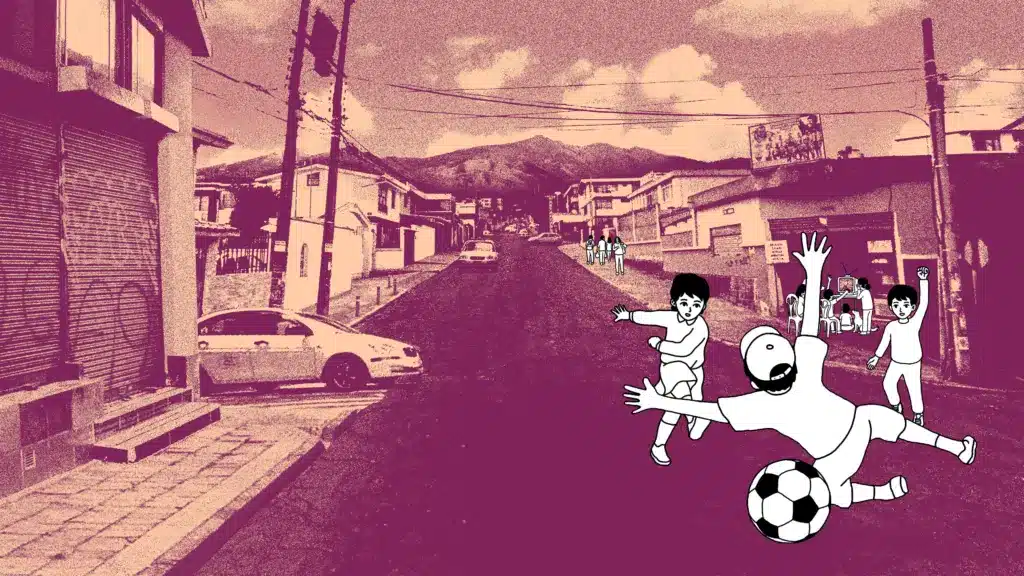Despelote – A Heartfelt Ode to Childhood and Soccer
May 2, 2025
*Despelote*, released May 1, 2025, by developers Julián Cordero and Sebastián Valbuena and published by Panic, is a poignant indie gem that transcends the label of a soccer game. Available on PC, PS4, PS5, Xbox Series X/S, and with a Switch version planned, this $14.99, two-hour narrative adventure immerses players in Quito, Ecuador, during the 2001 World Cup qualifiers. Through the eyes of eight-year-old Julián, a semi-fictional version of Cordero, *Despelote* weaves a tapestry of childhood nostalgia, community spirit, and the universal magic of soccer, crafting an experience that’s as emotionally gripping as it is visually striking. It’s a love letter to youth and sport that lingers long after the final whistle.
The narrative centers on Julián, a soccer-obsessed boy navigating life in Quito as Ecuador edges toward its first-ever World Cup qualification. Structured around five qualifying matches, the game unfolds in vignettes, each a snapshot of Julián’s world—schoolyards, family gatherings, bustling streets. The story isn’t about grand heroics but the quiet, messy beauty of childhood. You’ll kick a ball with friends, dodge a grumpy neighbor, or sneak glances at match broadcasts on shop TVs, all while soaking in the nation’s feverish hope. Julián’s perspective, rendered with a child’s blend of wonder and distraction, grounds the experience, making every moment feel authentic. Choices, like whether to obey your mom’s curfew or chase a stray ball, shape small but meaningful interactions, adding a light layer of agency that mirrors a kid’s fleeting freedoms.
Gameplay is deliberately minimal, prioritizing atmosphere over mechanics. The core action—kicking a soccer ball, bottle, or balloon—uses a right-stick flick that feels satisfyingly clumsy, capturing Julián’s unpolished enthusiasm. You’re not a pro; you’re a kid, missing shots or tripping over your own feet, which makes every successful kick a tiny triumph. Beyond kicking, you explore sandbox-like areas, interacting with objects or eavesdropping on Spanish-language conversations (translated via text bubbles). Mini-games, like a retro *Tino Tini’s Soccer 99* or hide-and-seek with Julián’s sister, add playful variety, though they’re secondary to the narrative. The lack of objectives can feel aimless at times, but it mirrors childhood’s unstructured joy, encouraging you to wander and absorb Quito’s vibrant pulse.
Visually, *Despelote* is a masterpiece of memory. Its art style blends digitized photos of Quito with a hazy, Polaroid-like filter, bathing environments in sepia, purple, or green tones. Characters and objects, like Julián’s soccer ball, are hand-drawn in stark black-and-white, standing out against fuzzy backgrounds like vivid recollections. The effect is dreamlike, evoking the way childhood memories blur at the edges. Surreal transitions—kicking a ball in a void as Quito’s towers sprout around you—lean into magical realism, amplifying the game’s emotional depth. Running at 1080p 60fps on PS5 and PC, with solid performance on older consoles, the visuals are both accessible and breathtaking. Minor texture glitches in crowded scenes are rare, and a May 3 patch smoothed camera controls, enhancing immersion.
The soundtrack is equally evocative, weaving traditional Ecuadorian music with ambient street sounds—chattering neighbors, distant radios, sizzling street food. Voice acting, featuring Cordero’s real family and friends, feels raw and unscripted, capturing the cadence of everyday life. Conversations trail off or overlap, mirroring how a child overhears adult worries about economic strife or match outcomes. The audio, paired with real 2001 match footage on in-game TVs, grounds the experience in a specific time and place, making Quito feel alive. These elements combine to create a sensory experience that’s both intimate and universal, resonating even if you’ve never set foot in Ecuador or cared for soccer.
Replayability is limited due to the game’s linear, two-hour runtime, but its emotional weight invites reflection. Revisiting scenes to catch missed dialogue or explore new interactions offers some incentive, and achievements tied to *Tino Tini’s Soccer 99* add a fun challenge for completionists. The lack of robust gameplay mechanics might disappoint players seeking deeper systems, and the finicky kicking controls can frustrate during precision tasks, like hitting bottles. A dark hide-and-seek segment, where finding Julián’s sister feels overly tough, briefly disrupts the flow. Yet, these flaws feel intentional, reflecting the imperfections of memory and childhood’s unpredictability, and they’re far outweighed by the game’s heart.
*Despelote* shines brightest in its ability to transform a personal story into a universal one. Soccer is the lens, but the game is about connection—between family, friends, and a nation united by hope. Flash-forwards to Julián’s teenage years, where he grapples with fading passions, add a bittersweet layer, reminding us how time reshapes our dreams. The game’s meta moments, where Cordero reflects on its creation, feel like a warm conversation with a friend, inviting you to cherish your own memories. It’s a rare title that doesn’t demand you love soccer to feel its impact, though fans of the sport will find extra resonance in its depiction of fandom’s communal joy.
*Despelote* is a triumph of indie storytelling, proving that small games can leave big impressions. Its blend of nostalgic visuals, authentic audio, and gentle gameplay crafts a Quito that’s both Cordero’s and yours, a place where kicking a ball feels like chasing eternity. For fans of narrative adventures or anyone craving a heartfelt escape, this is a must-play, earning a top spot in 2025’s indie lineup. Julián’s journey is short but unforgettable—lace up, kick off, and lose yourself in this beautiful ode to youth. #GameReviews #Despelote


